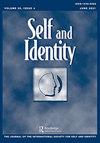社会阶层认同整合与新生代大学生的成功:前提、机制与可推广性
IF 1.7
4区 心理学
Q3 PSYCHOLOGY, SOCIAL
引用次数: 4
摘要
摘要社会阶层双文化身份整合研究表明,整合的社会阶层身份与第一代学生更好的健康、幸福和学习成绩有关。在这里,我们证明了大学前在学生家庭社区接触大学毕业生与更高社会阶层的双文化身份整合呈正相关(研究1),身份整合对学业成绩的影响是由学业自我效能介导的(研究2),身份融合对文化适应压力、生活满意度,以及在一所大型公立大学观察到的整体健康结果,在选择性私立大学中进行了复制(研究3)。这表明,身份整合框架是一个有用的理论视角,可以概念化和预测第一代学生的健康和表现结果。本文章由计算机程序翻译,如有差异,请以英文原文为准。
Social Class Identity Integration and Success for First-Generation College Students: Antecedents, Mechanisms, and Generalizability
ABSTRACT Social class bicultural identity integration research demonstrates that integrated social class identities are linked with better health, well-being, and academic performance among first-generation students. Here, we demonstrate that exposure to college graduates in students’ home neighborhoods before college is positively related to higher social class bicultural identity integration (Study 1), that the effect of identity integration on academic performance is mediated by academic self-efficacy (Study 2), and that the effects of identity integration on acculturative stress, life satisfaction, and overall health outcomes observed at a large, public university replicated at selective, private universities (Study 3). This suggests that the identity integration framework is a useful theoretical lens to conceptualize and predict health and performance outcomes for first-generation students.
求助全文
通过发布文献求助,成功后即可免费获取论文全文。
去求助
来源期刊

Self and Identity
PSYCHOLOGY, SOCIAL-
CiteScore
5.10
自引率
5.00%
发文量
26
期刊介绍:
Work on self and identity has a special place in the study of human nature, as self-concerns are arguably at the center of individuals" striving for well-being and for making sense of one"s life. Life goals develop and are influenced by one"s view of what one is like, the way one would ideally like to be (or would like to avoid being), as well as one"s perceptions of what is feasible. Furthermore, conceptions of self and the world affect how one"s progress towards these goals is monitored, evaluated, redirected, re-evaluated, and pursued again. Thus, the “self” as a construct has far-reaching implications for behavior, self-esteem, motivation, experience of emotions and the world more broadly, and hence for interpersonal relationships, society, and culture.
 求助内容:
求助内容: 应助结果提醒方式:
应助结果提醒方式:


